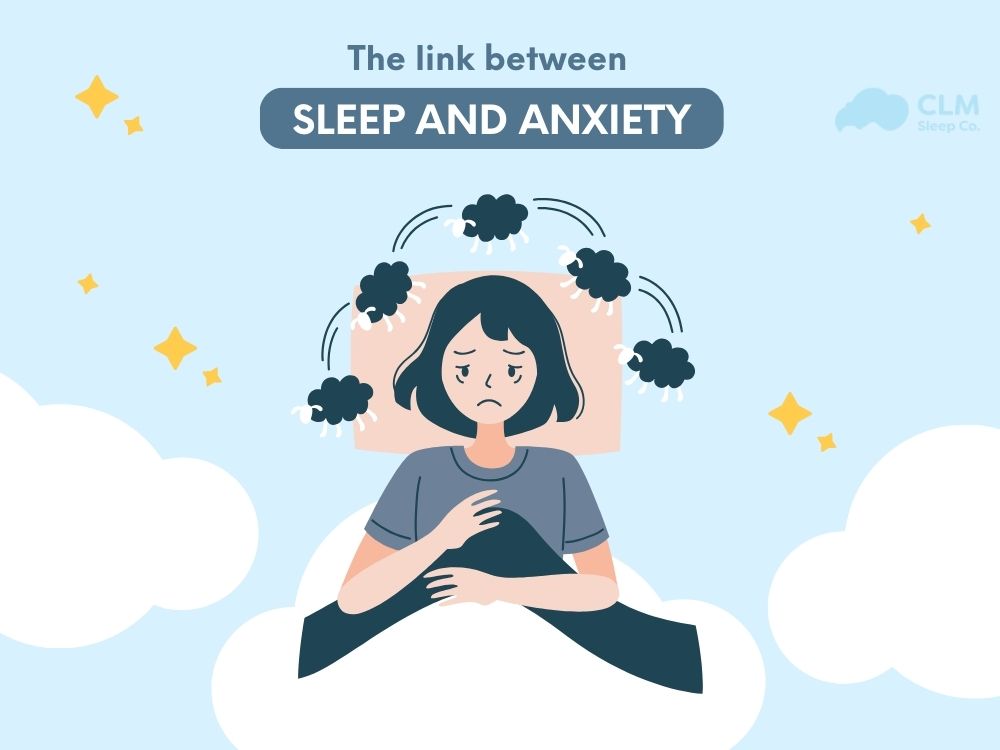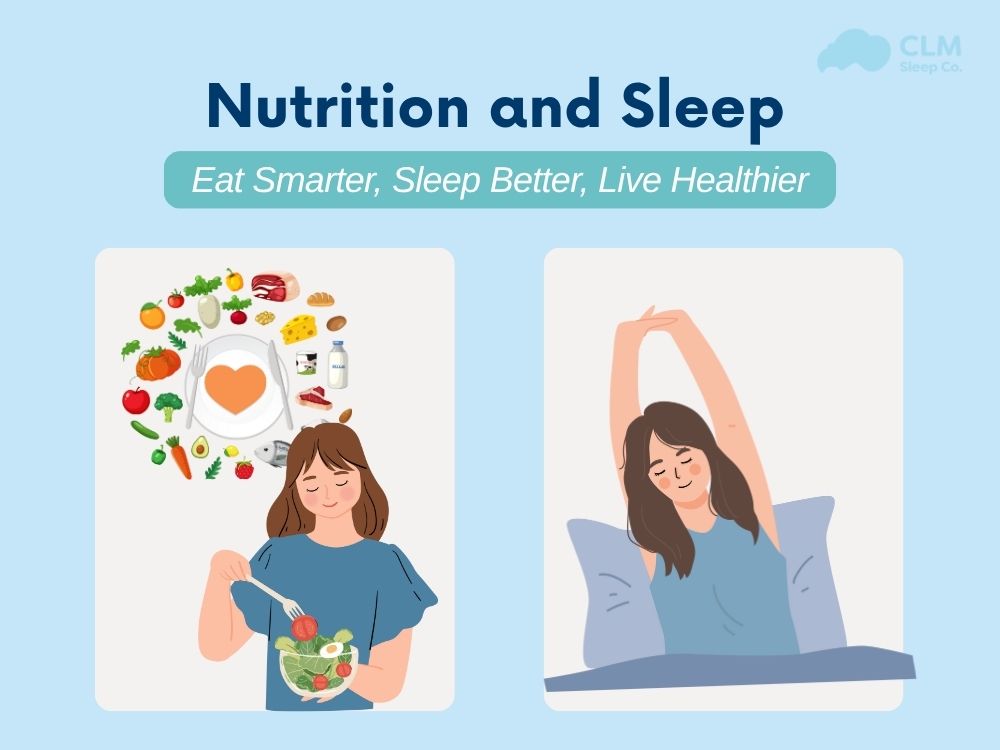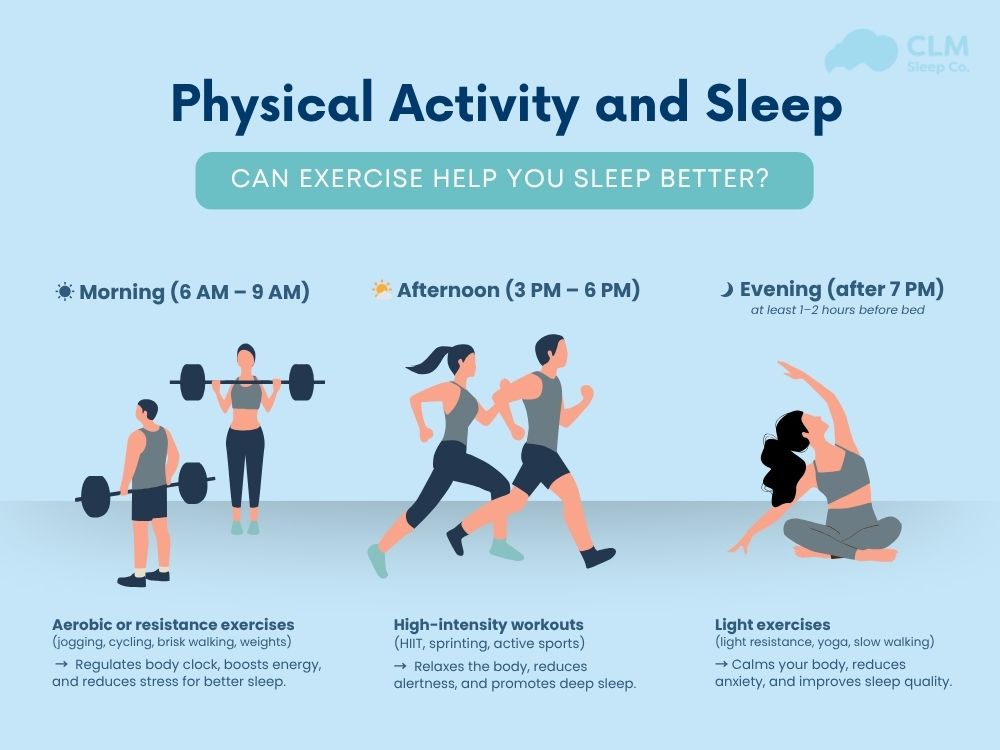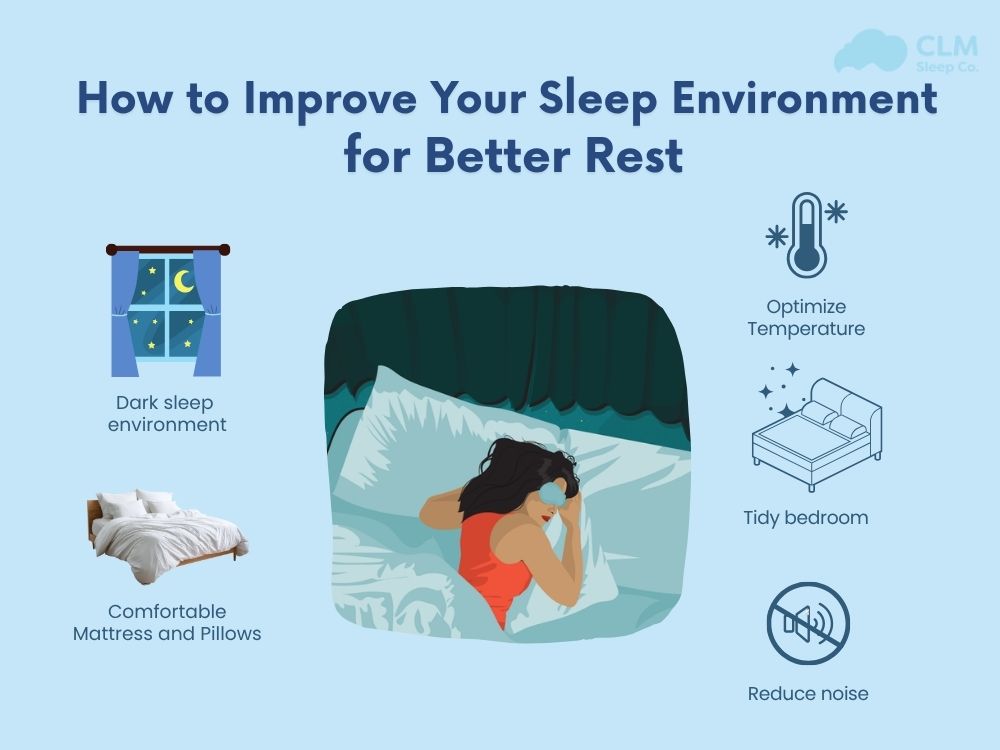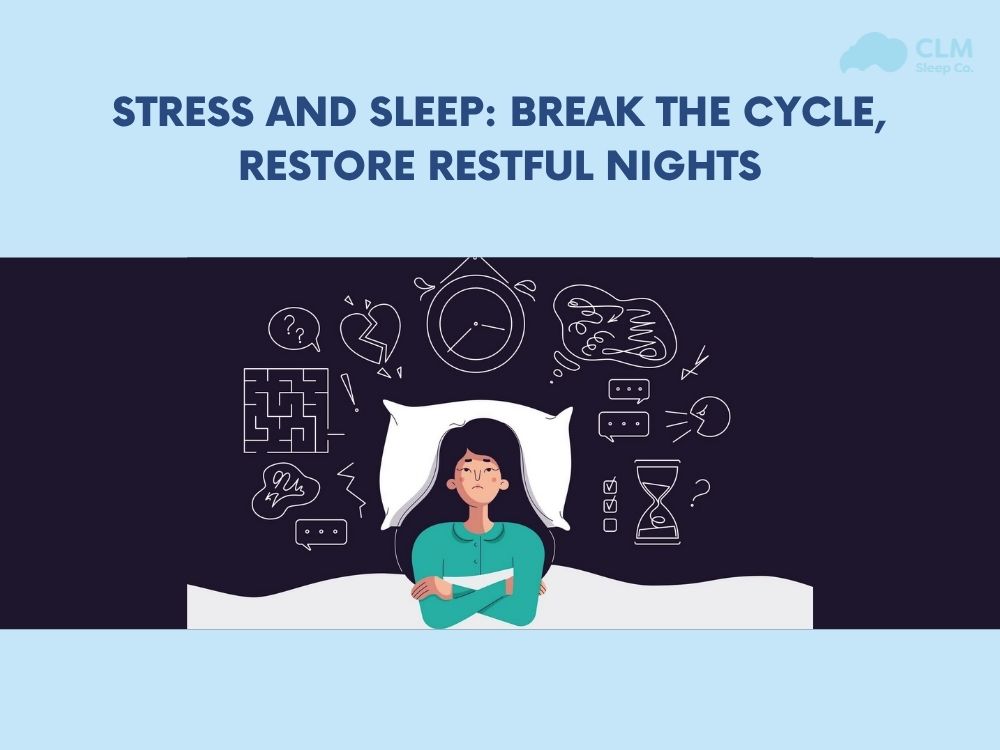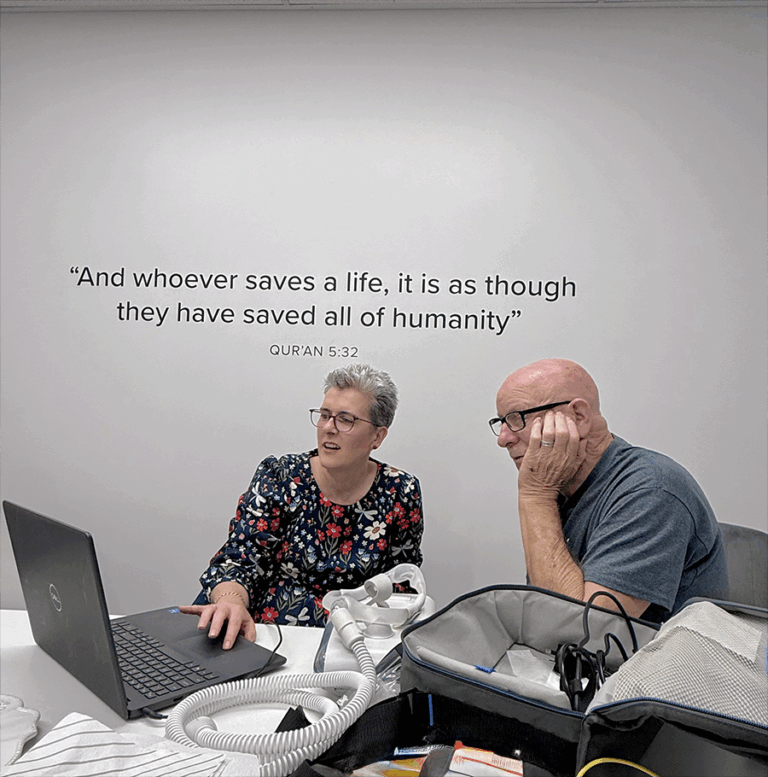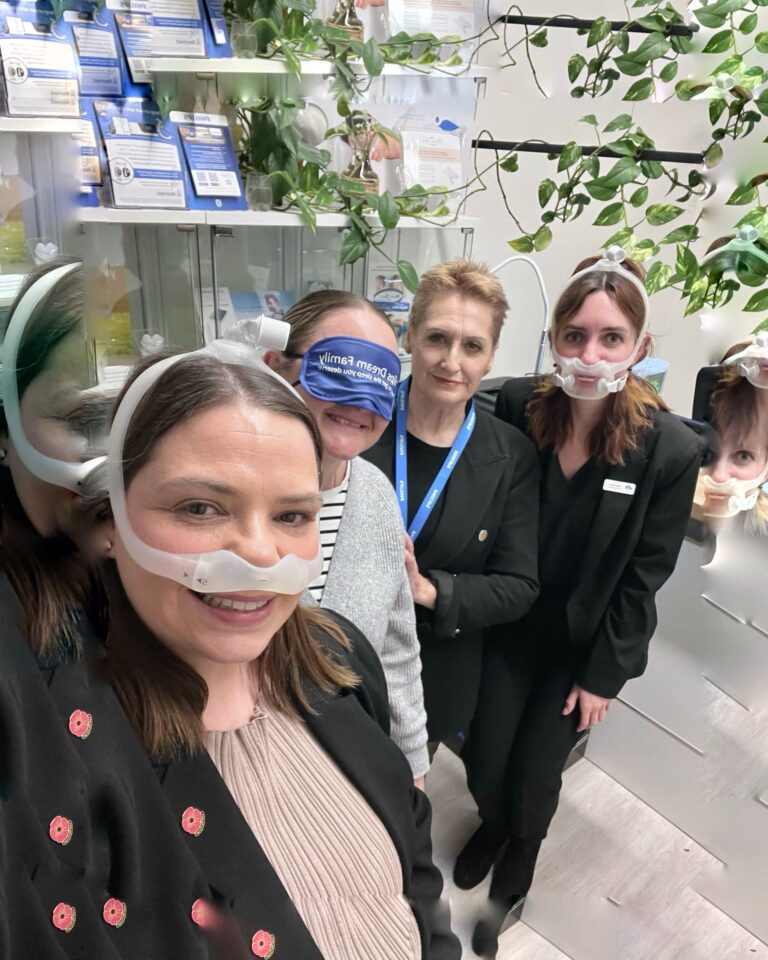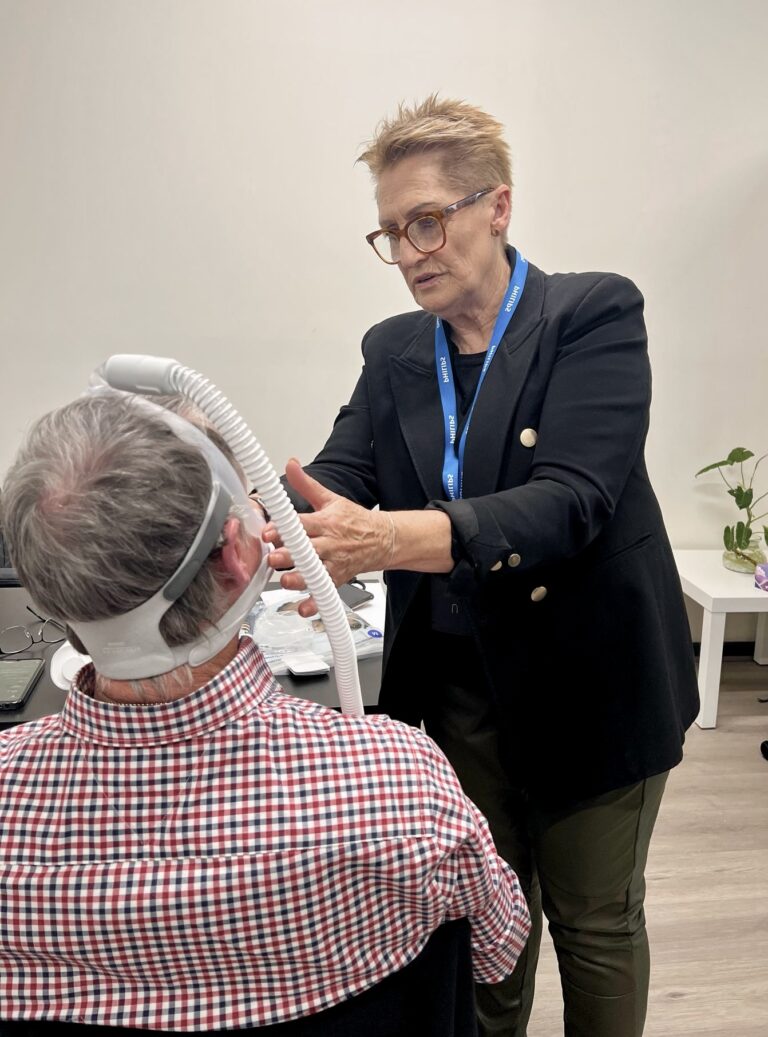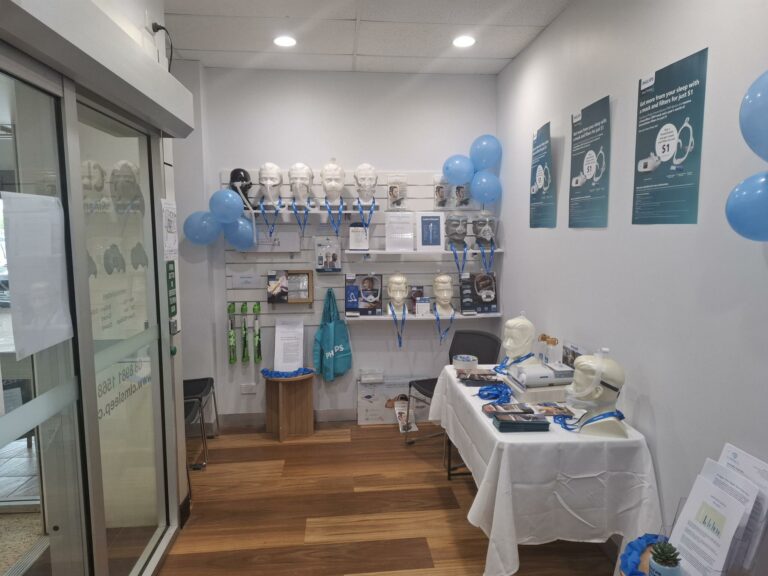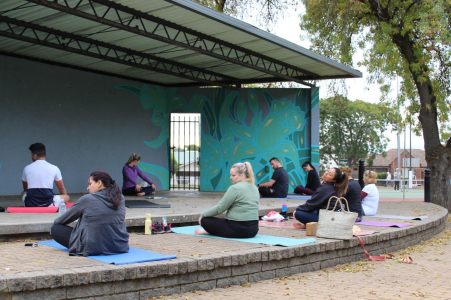How does the close relationship between sleep and anxiety affect your quality of life? How can you overcome this situation? Sleep and anxiety are often intertwined in a silent cycle that gradually wears down our health. Prolonged anxiety disrupts restful sleep, leaving the body drained, the mind tense and daily life affected. so, how can we break free from this “trap” and regain peaceful nights of rest? Let’s explore the answers in the article below.
What Is Anxiety?
Anxiety is one of the most common mental health challenges in the world, but is often misunderstood. At its core, anxiety is the body’s natural response to stress, a mechanism that once helped humans survive dangerous environments. However, when anxiety becomes excessive, prolonged, or disproportionate to the actual threat, it transforms from a protective tool into a disruptive condition.
Millions of people today live with some form of anxiety disorder and one of the most visible consequences is its impact on rest. To understand the relationship between sleep and anxiety, we need to discover what anxiety really is and why it strongly affects the body’s ability to rest.
Experience anxiety in each person every time, the stage is different, but many people describe it as a “background noise ” in the mind. A stream of worries that doesn’t switch off, even at bedtime. Anxiety can feel like:
- Persistent nervousness: Feeling of anxiety unknown cause
- Racing through: Repeated lines of thought and anxiety cannot escape, often appearing when sleeping.
- Physical tension: Muscle spasticity, teeth grinding, headache, or abdominal angina, sometimes nausea.
- HHeightened heart rate: Suspense, rapid breathing, or tremor of limbs or full body
- Restlessness: Feeling unable to sit still or relax
Types of anxiety disorders
There isn’t just one type of anxiety, its umbrella term covering several disorders, each with unique patterns but similar effects on sleep and mental health.
- Generalized anxiety disorder (GAD): Excessive anxiety, prolonged on many routine issues.
- Panic disorder: Intense and sudden panic attacks accompanied by distinct physical symptoms.
- Social anxiety disorder: Intense fear of social interactions, leading to overthinking events before and after they happen.
- Phobias: Intense fear for specific situations or objects.
- Obsessive – compulsive disorder (OCD): intrusive thoughts that demand repetitive actions, which can delay sleep onset or cause nighttime awakening.
All of these forms can push people into a spiral of sleep and anxiety. Difficulty sleeping increases worry, while worry sabotages rest.
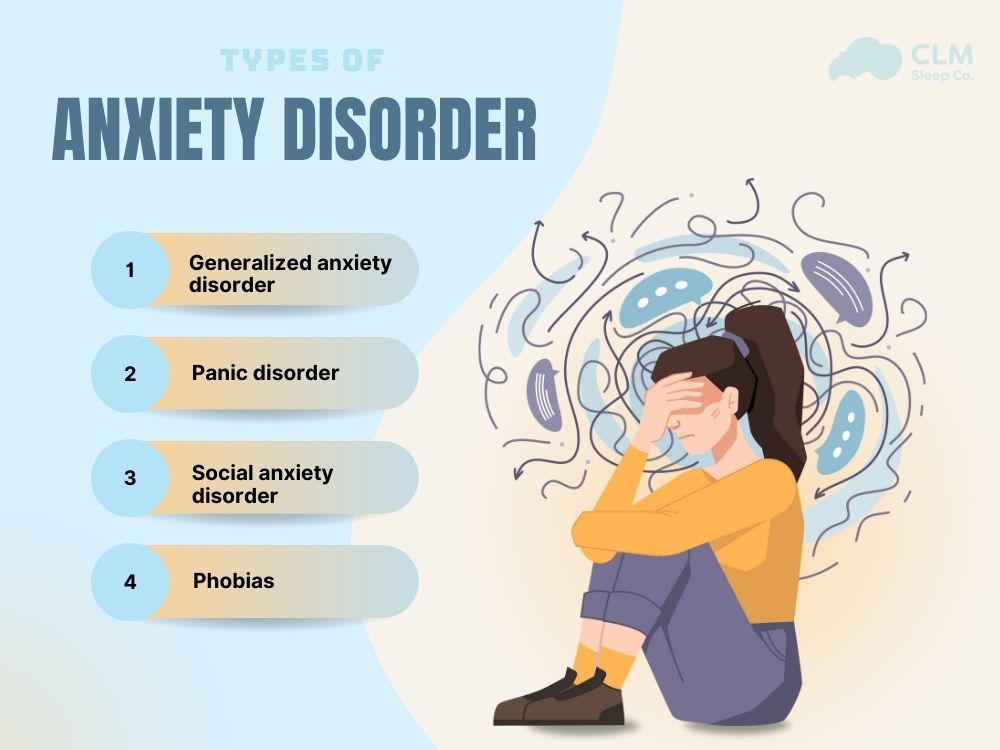
How Anxiety Affects Sleep
Anxiety interrupts sleep both psychologically and physiologically. Mentally, the line of uncontrollable thinking makes the brain unable to “switch off ” to rest. Instead of drifting into rest, the mind delays conversations, imagines worst case scenarios or obsesses over tomorrow’s tasks.
In terms of physical health, anxiety triggers the “fight or flight” response in cells. Stress hormones like cortisol, adrenaline, … often cause the heart to beat quickly, blood pressure increases, and the body is on high alert. For people with this condition, it is difficult to fall into deep sleep.
Even when sleep does come, it is often just light sleep, not deep enough to leave you fully rested. For those with anxiety, common sleep difficulties include:
- Difficulty falling asleep.
- Walking up multiple times during the night.
- Having intense or disturbing dreams.
- Wake up too early without feeling refreshed.
Anxiety can disrupt sleep stages, making it difficult to achieve REM sleep, which plays a crucial role in processing emotions. Lack of REM sleep makes it difficult for the brain to regulate mood, making you more susceptible to stress the next day.
How Sleep Deprivation Worsens Anxiety
The link between lack of sleep and anxiety goes both ways. Not only does anxiety disrupt sleep, but lack of sleep also worsens anxiety.
When sleep-deprived, your brain’s prefrontal cortex, which regulates emotions, will function less effectively, while the amygdala, the center for processing fear, becomes overly sensitive. This imbalance leads to exaggerated reactions to daily challenges.
The consequences include:
- Heightened irritability: Getting easily angry over small things can also be annoying.
- Impaired focus: Difficult to remember and handle tasks
- Increased physical tension: The main body is in a stressed state, fueling further worry.
- Reduced resilience: easily feel pressure, heaviness in any situation in life from work, relationships
In other words, sleep deprivation and anxiety are like two negative “companions”. The less you sleep, the more anxious you feel. The more anxious you feel, the harder it becomes to sleep.
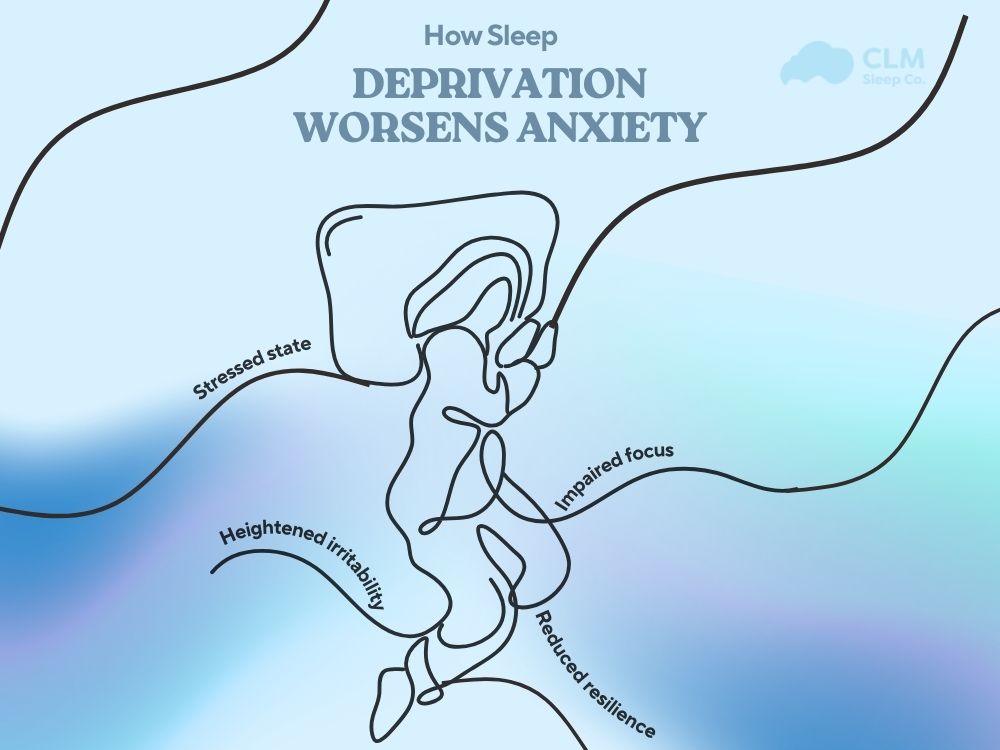
Common Sleep Disorders Linked to Anxiety
Anxiety not only causes ordinary insomnia but is also closely related to many specific sleep disorders. Influence on the development and treatment process for patients.
Insomnia
This is the most common consequence issue related to anxiety, insomnia is the inability to fall or stay asleep. People who suffer from insomnia due to anxiety often find themselves looking at the clock at night, worrying about not getting enough rest. This anticipation alone can be enough to keep them awake.
Nighttime panic attacks
For some, anxiety escalates at night into intense panic attacks. These episodes wake individuals with a racing heart, sweating, even a sense of impending room. After such experiences, they find it hard to sleep again, and many begin to associate bedtime with fear.
Restless leg syndrome
This neurological condition causes tingling, crawling or uncomfortable sensations in legs. Anxiety amplifies these sensations, making it nearly impossible to stay still and fall asleep. The cycle of movement and frustration can last for hours.
Sleep apnea
Although sleep apnea is primarily a physical disorder related to breathing cessation, it is also closely related to anxiety. Waking up due to gasping for breath can cause panic, and those with high levels of anxiety may experience extreme stress during these apnea episodes.. Untreated sleep apnea also increases the risk of long-term mental health issues.
Sleep anxiety
Unlike the disorders above, “Sleep anxiety” is not considered an independent disorder, but it is very common in people with anxiety. It refers to the fear of not being able to sleep, ironically making it even harder to sleep. People may lie in bed worrying “What if I can’t sleep again tonight?”. This fear quickly turned into a self-fulfilling prophecy, reinforcing the connection between sleep and anxiety.
Tips to Manage Anxiety for Better Sleep
Thanks to technology and the outstanding development of medicine, many strategies have been researched and proven to help improve sleep and reduce anxiety. Here are some suggestions to help improve your sleep:
- Create a consistent bedtime routine: Go to bed and wake up at the same time every day to stabilize your biological clock.
- Limit stimulants: Limit the consumption of beverages and foods containing caffeine and nicotine in the afternoon and evening.
- Minimize exposure to electronic devices, blue light: Avoid using phones and computers at least 1 hour before sleeping.
- Practice relaxation exercises: techniques like meditation, yoga or deep breathing help calm the nervous system before sleep.
- Journaling your worries: Awareness and calming the mind by writing everything down when you feel overwhelmed helps you relax more easily.
- Exercise regularly: Balance daily activities to help reduce overall stress and promote deeper sleep.
- Make your bedroom sleep friendly: Keep the environment cool, dark and quiet. Reserve the bed for rest and intimacy only.
- Consider professional help: Cognitive-behavioral therapy for insomnia (CBT-I) or conditions affecting sleep such as sleep apnea with CPAP devices,….
When applying these habits, people with anxiety can somewhat break the cycle and find peace in sleep.
Conclusion
The relationship between sleep and anxiety is extremely close. Similar to disorders such as insomnia, night panic, restless legs syndrome, or sleep apnea, they all demonstrate the close relationship between sleep and mental health. However, the important thing is: this cycle can be broken. With the right mindset, building healthy habits, and support from professionals, you can completely regain deep sleep and peace of mind. Remember: Good sleep is not only comfort but also the foundation for emotional balance, clear intellect, and a healthy spirit.
